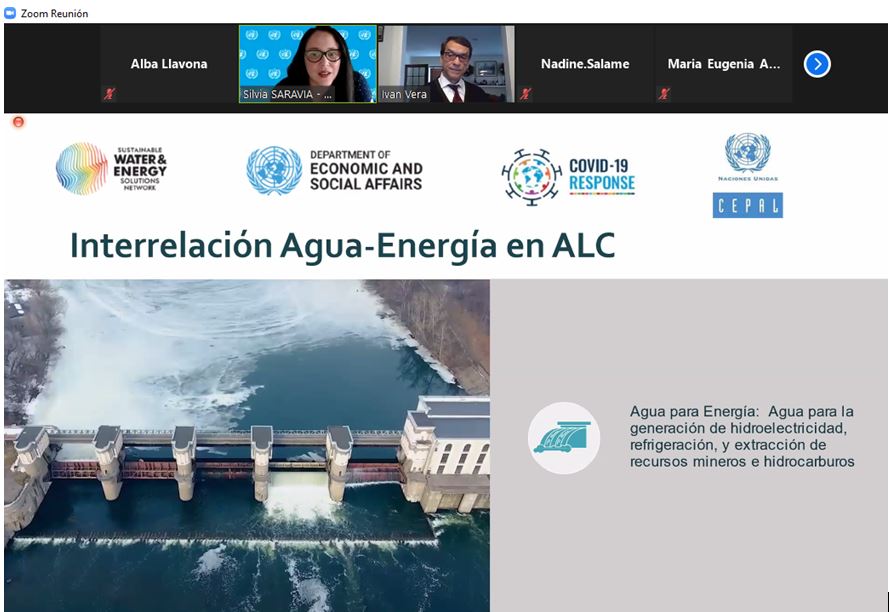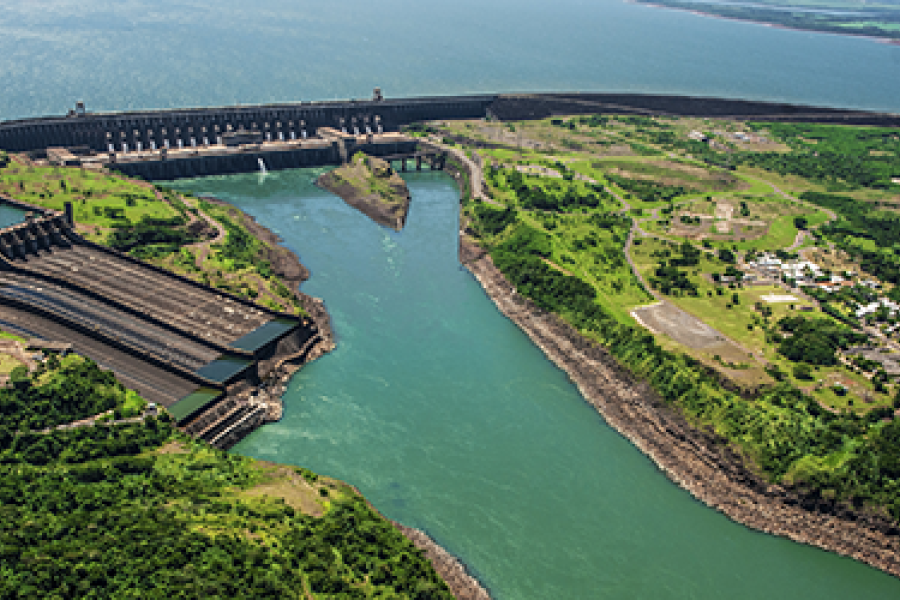Regional Capacity Development in Latin America and the Caribbean “Integrated water and energy systems supporting a sustainable recovery from Covid-19”
Work area(s)
Teaser
Exchange and dissemintation of knowledge on integrated water and energy systems in Latin America and the Caribbean and its relationship with post Covid-19 recovery.
The Sustainable Development Goals Division of the United Nations Department of Economic and Social Affairs (UN DESA) and its association with Itaipu Binacional “Sustainable Water and Energy Solutions” together with the United Nations Economic Commission for Latin America and the Caribbean The United Nations (ECLAC) organized the virtual seminar on capacity development in Latin America and the Caribbean (LAC) "Integrated water and energy systems for a sustainable recovery from Covid-19". The event had more than 70 participants from all over the world, and was moderated by Mr. Iván Vera, counselor of UN DESA, also had the participation of experts panelists from 5 countries in the region that highlighted the interrelation between the water sector and energy, as well as innovation experiences to pursue a more integrated and sustainable use of these resources.
The event started with the welcoming remarks of Ms Silvia Saravia Matus, from the Water and Energy Unit of the Natural Resources Division of ECLAC, who contextualized the current situation in LAC in terms of water and energy and their interrelation, highlighting the importance of implementing sustainable and integrated solutions to achieve universal access to these services, and contribute to health, climate action, among many others.
Subsequently, Ms Lisbeth Naranjo, Consultant of the Water and Energy Unit of the Natural Resources Division of ECLAC, presented the “Methodological Guidelines: Design of actions with a focus on the Nexus between water, energy and food for countries of Latin America and the Caribbean ”. Lisbeth defined this practical tool under the Nexus approach and the need for its application to achieve coherent, effective and efficient policies. She also described how the guidelines will support the countries of the region to design and evaluate actions under this approach.
Then, from Paraguay, Mr Jimmy Melgarejo, Manager of the Itaipu Binacional Environmental Action Division, presented the “Itaipu Preserva” project that contemplates the restoration of degraded areas in the forests of the Itaipu Binacional Reservoir Protection Strip, constituting one of the largest reforestation projects at the regional level. Jimmy highlighted the great results they obtained in the recovery of biodiversity and the generation of information that can be replicated nationally and internationally.
After that, Mr Miguel Fernández, Executive Director of ENERGÉTICA, an NGO dedicated to facilitating universal access to energy in Bolivia, presented the problems caused by the lack of access to energy resources in the global context and how it has increased for the pandemic. He commented that in this sense, ENERGÉTICA has created several innovative solutions such as a solar energy kit for the electrical charging of small devices, the solar-powered hand washing station and a photovoltaic pumping system.
Next, Mr Alex Guerra, Director of the Climate Change Research Institute (ICC) of Guatemala, presented the experience of generating resilience through the management of water resources before and after disasters through the contribution of the sugar sector in Guatemala, highlighting the interrelationships between water, agriculture and energy with biomass production. He also noted that ICC seeks new sources of water and works with nature-based solutions, such as fog and rainwater harvesting to provide drinking water to rural communities.
Finally, Mr Ricardo Narváez, from the Ecuadorian Institute of Geological and Energy Research (IIGE), presented the research work on different Nexus actions carried out by the IIGE during the last years, such as geothermal energy for greenhouses and solar energy for pumping water, stressing the need to have not only technological alternatives but also financing.
The event was closed by Ms Isabel Raya, Sustainable Energy Consultant of the Sustainable Development Goals Division of UN DESA.
Schedule
|
Activity |
Detail |
|
Moderator |
Ariel Scheffer da Silva, Itaipu Binacional, Brazil |
|
Welcoming remarks |
Silvia Saravia, Water and Energy Unit, Natural Resources Division, ECLAC |
|
Introductory session |
Lisbeth Naranjo, Water and Energy Unit, Natural Resources Division, ECLAC |
|
Panel “Sharing experiences on integrated water and energy solutions” |
Jimmy Melgarejo, Itaipu Binacional, Paraguay Miguel Fernández, ENERGÉTICA- Bolivia Alex Guerra, Instituto de Investigación sobre Cambio Climático, Guatemala Ricardo Narváez, Instituto de Investigación Geológico y Energético (IIGE), Ecuador |
|
Closing remarks |
Isabel Raya, UN DESA |

